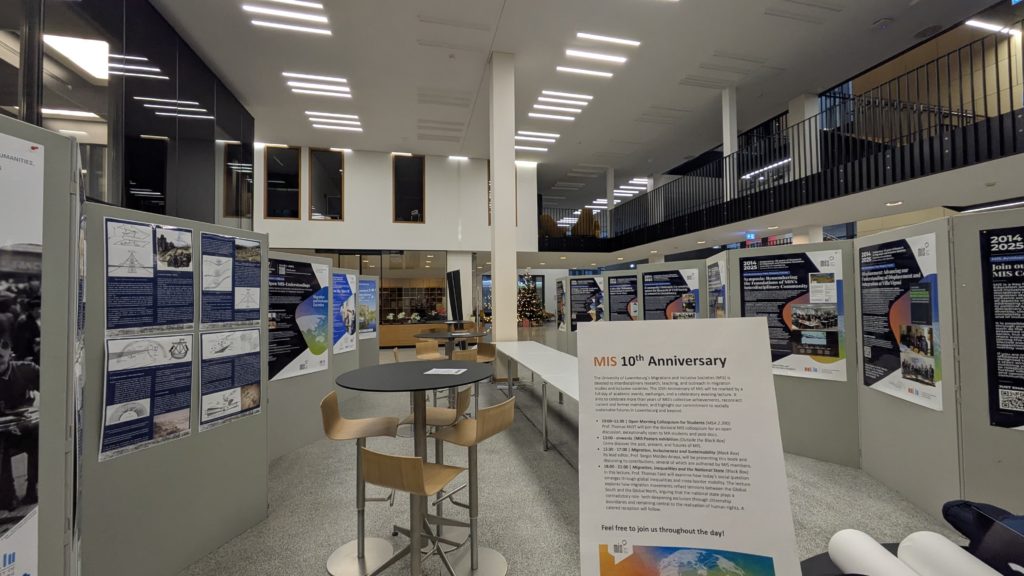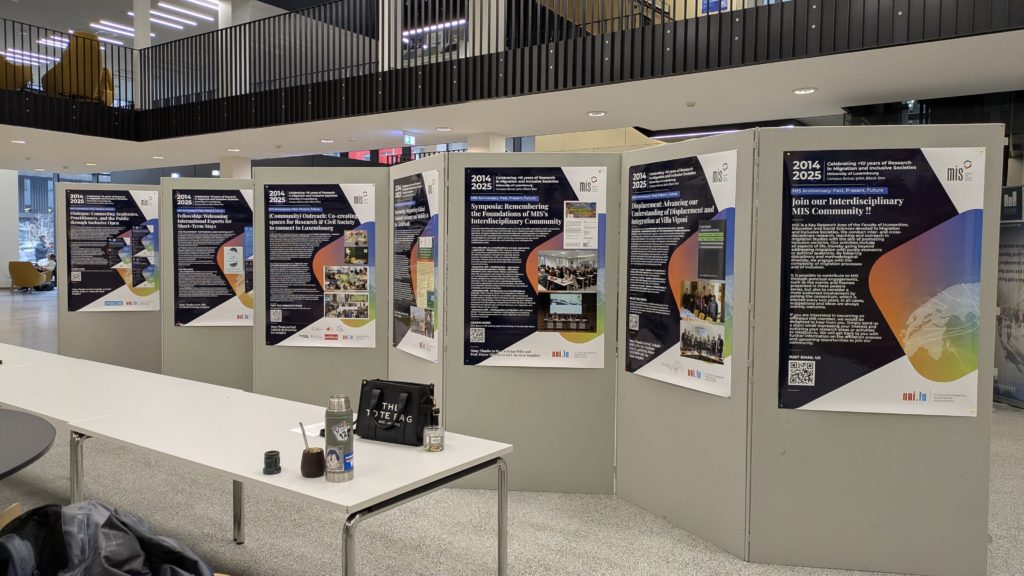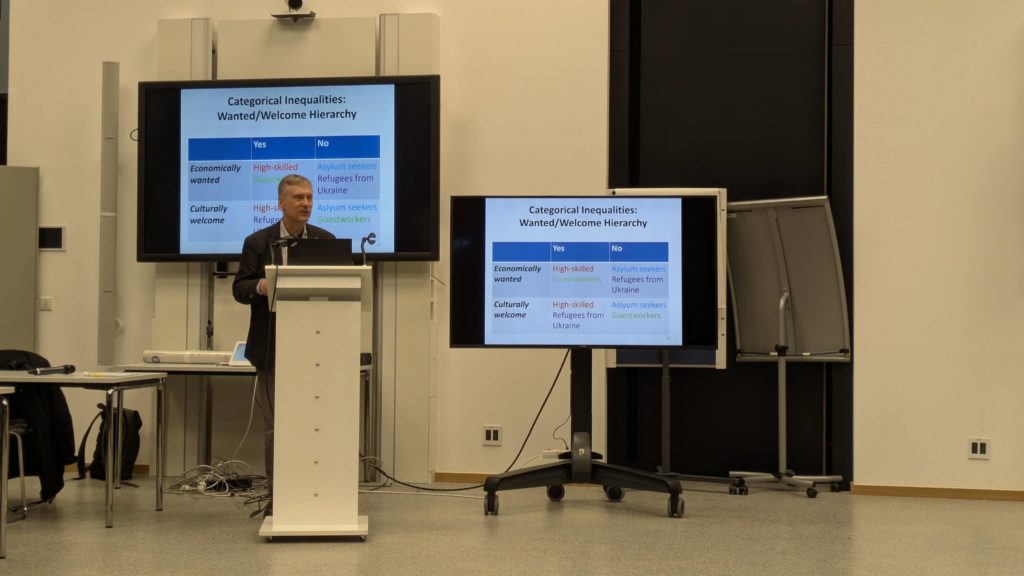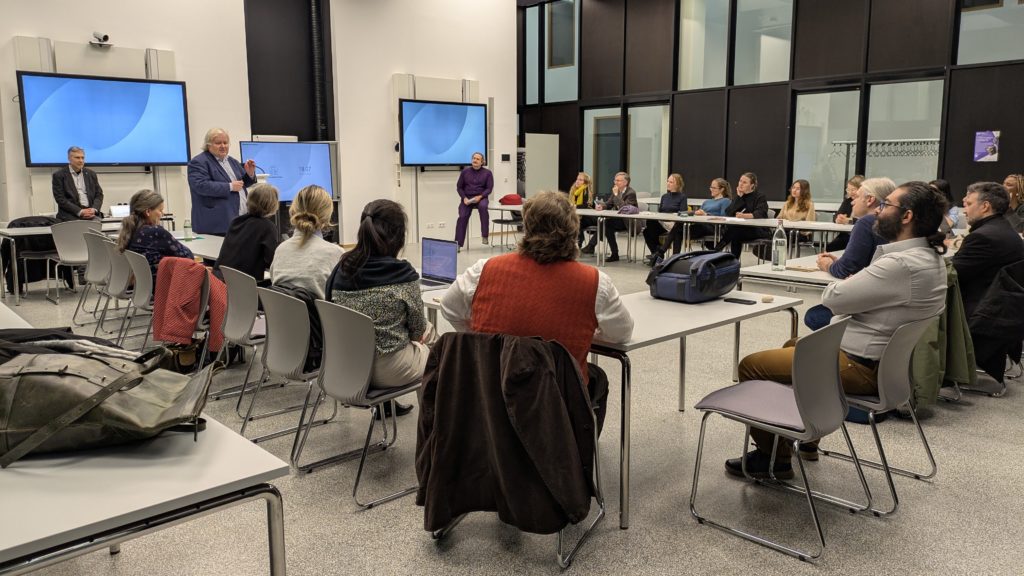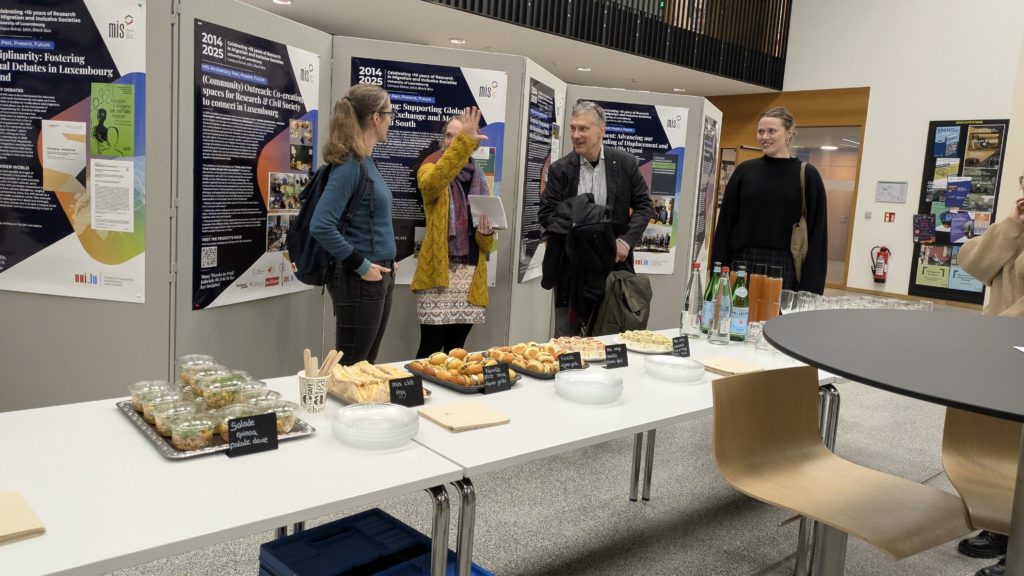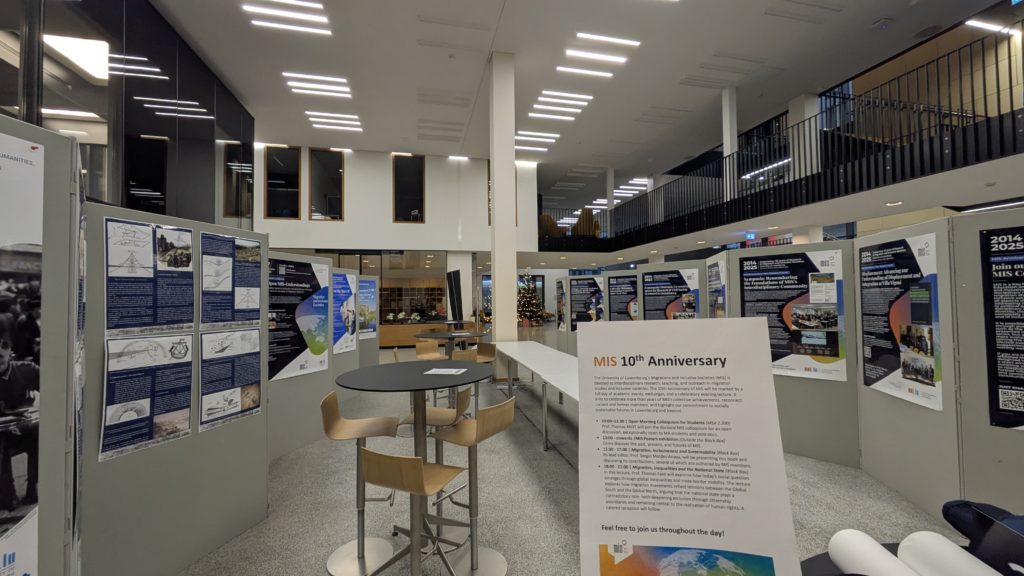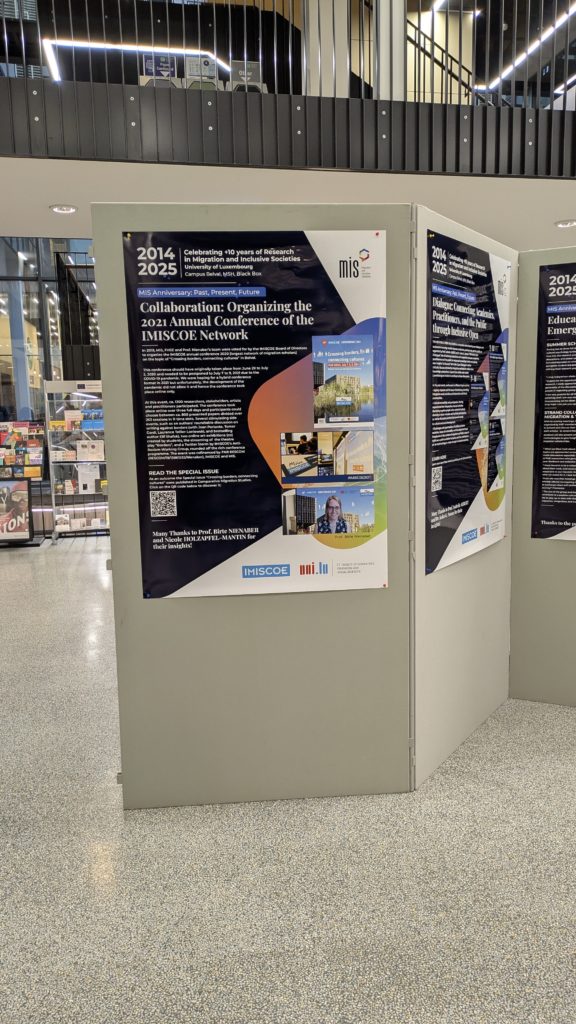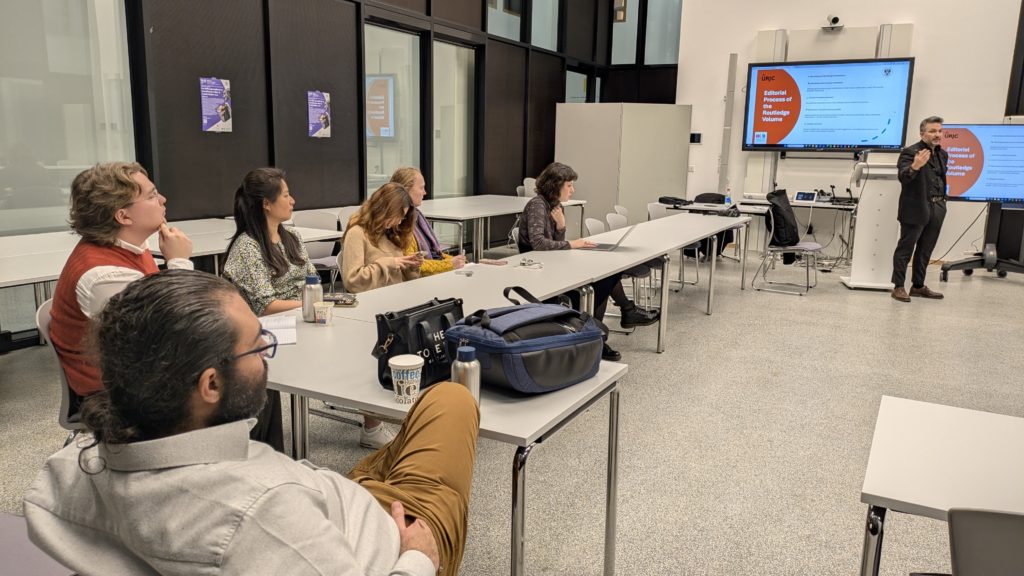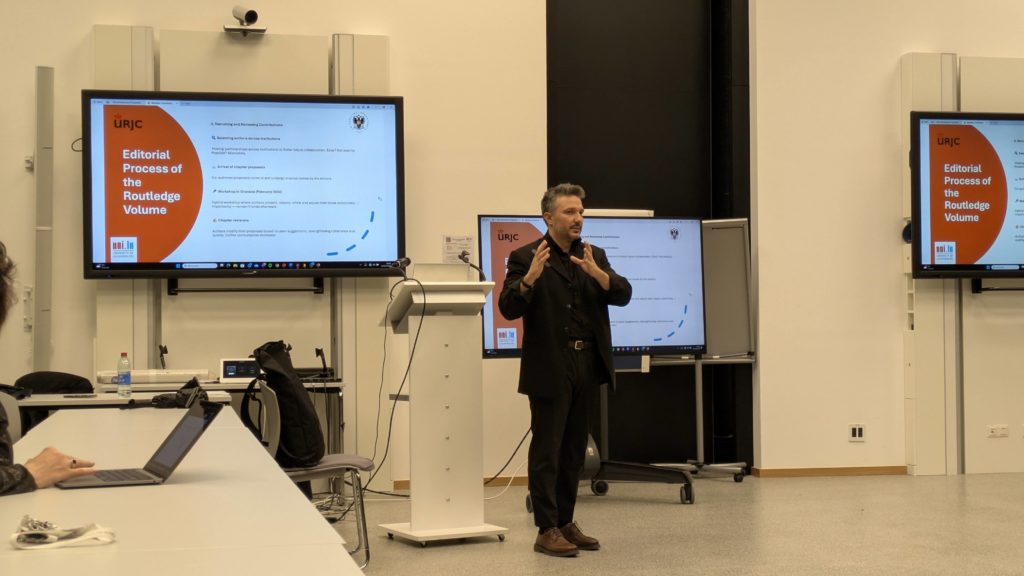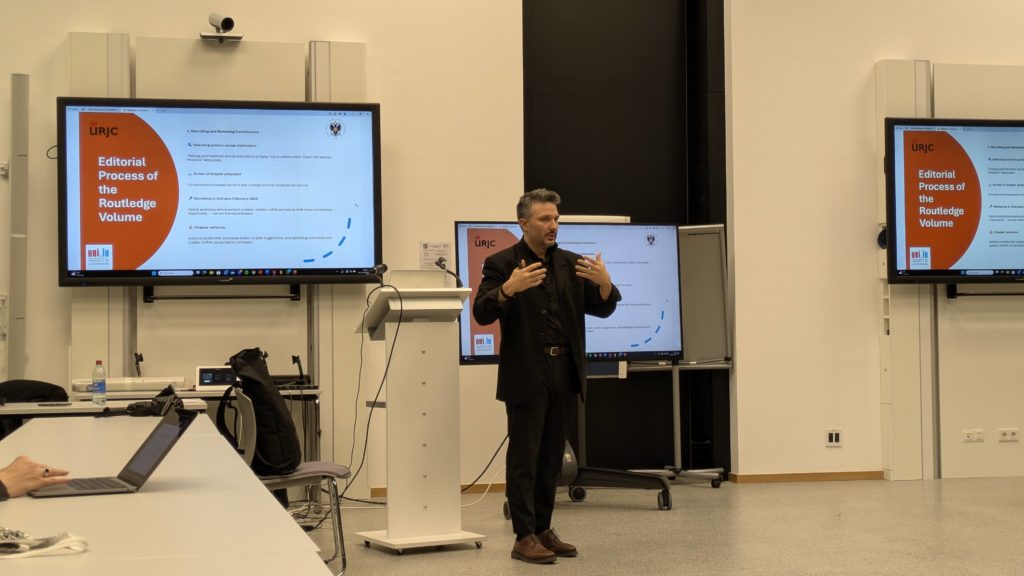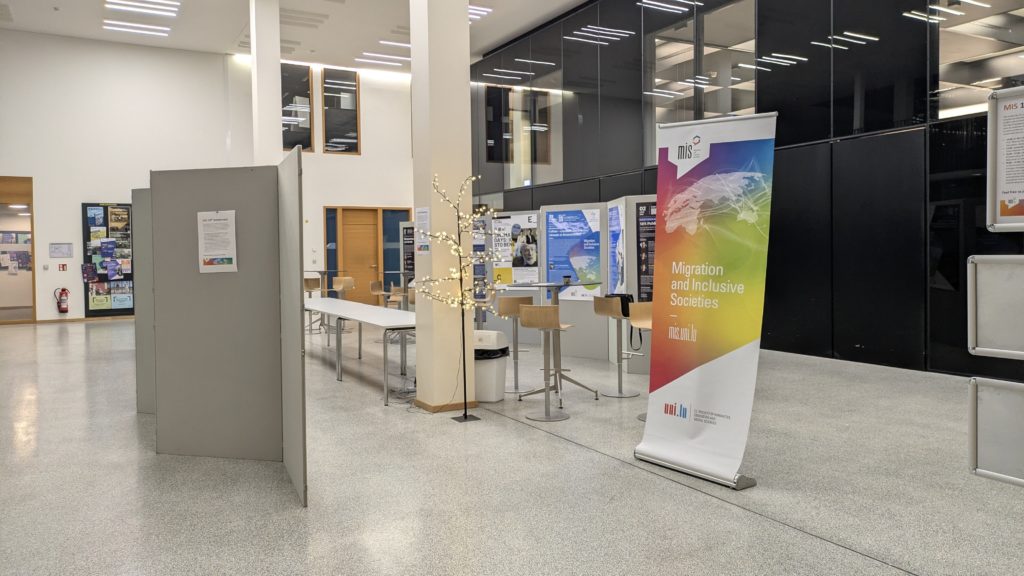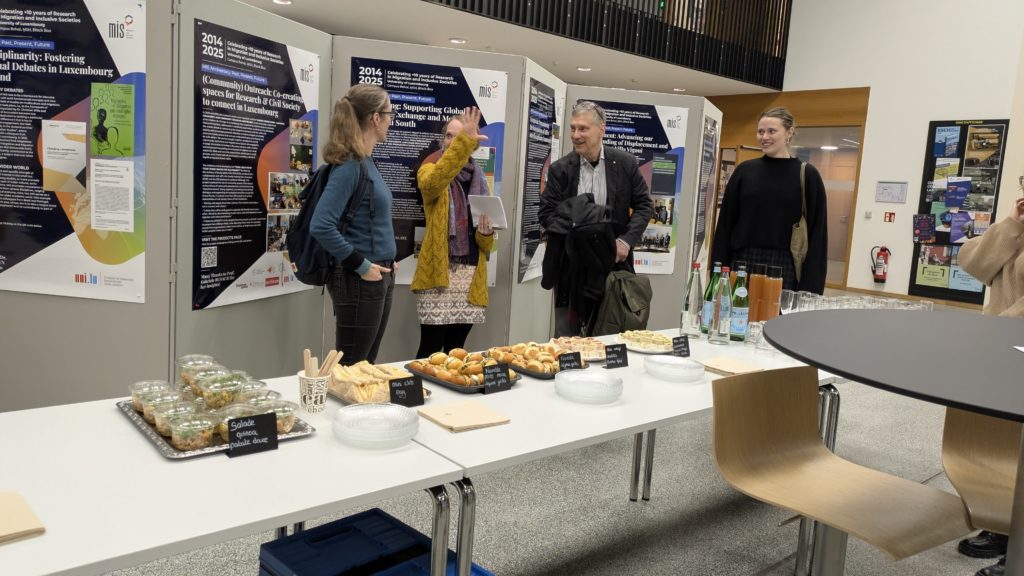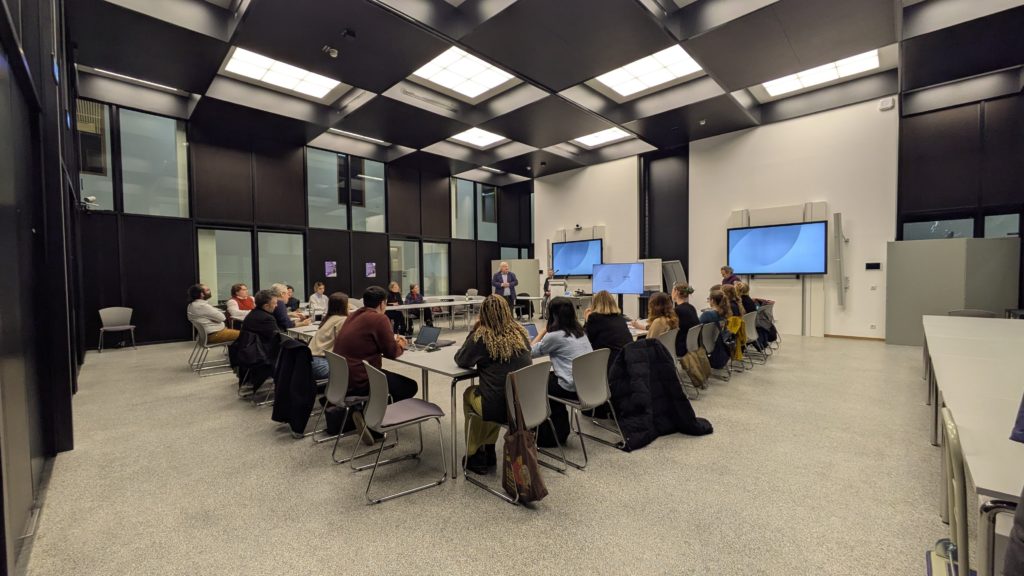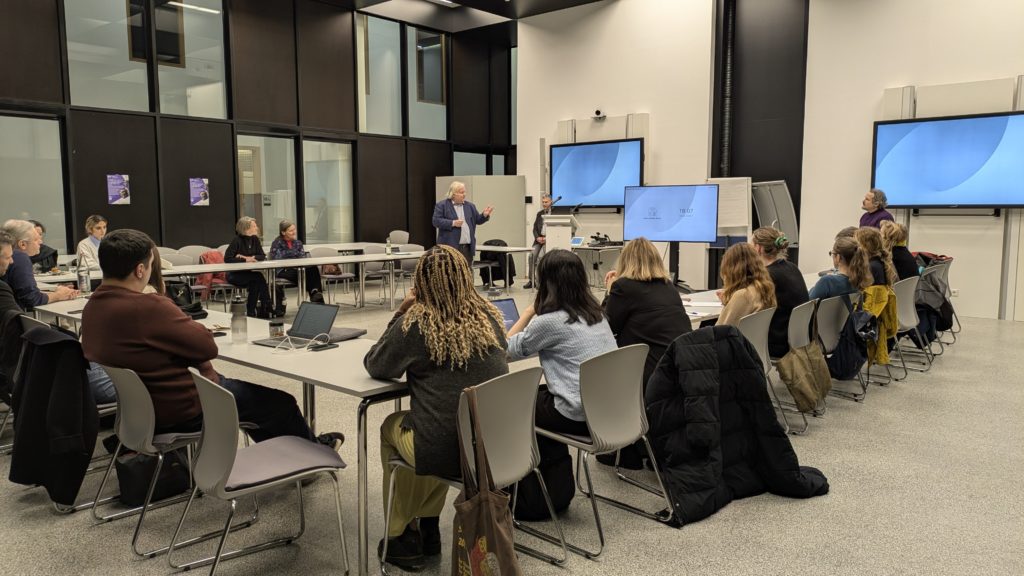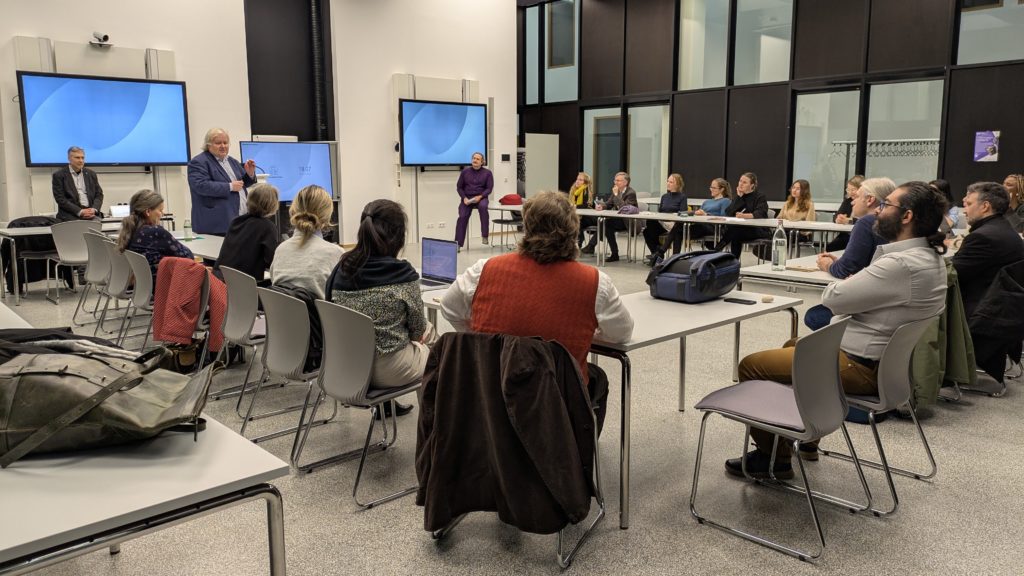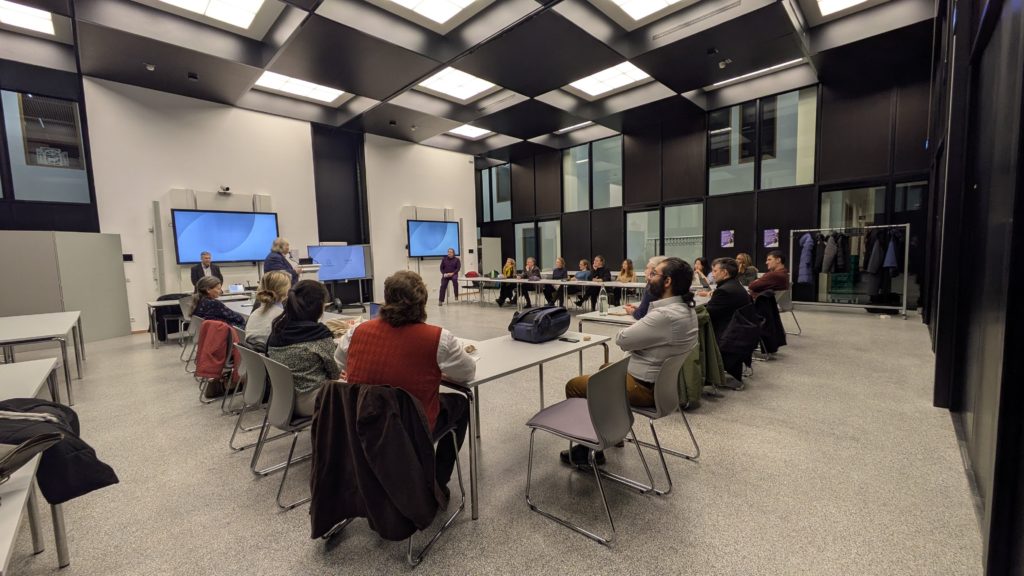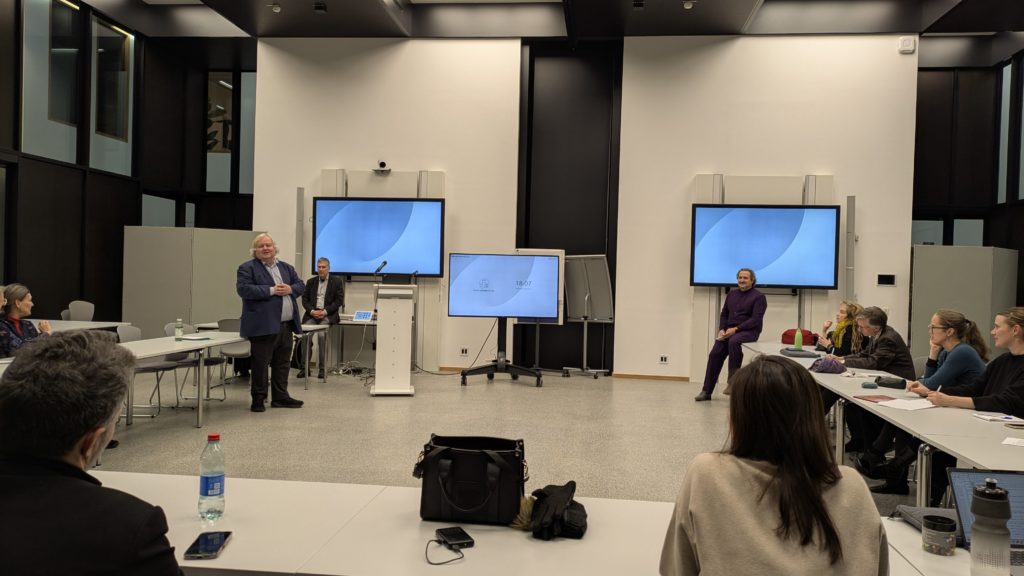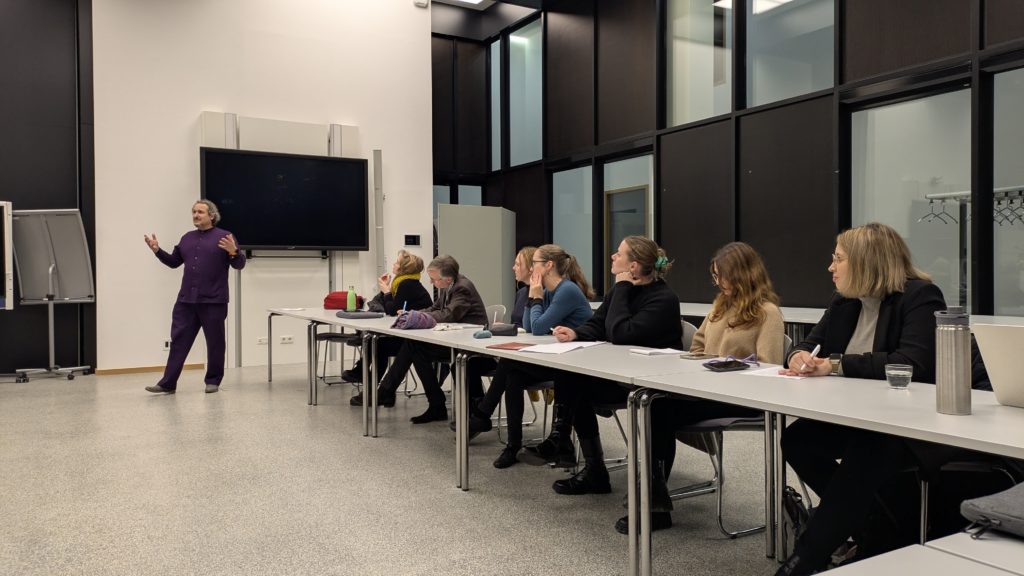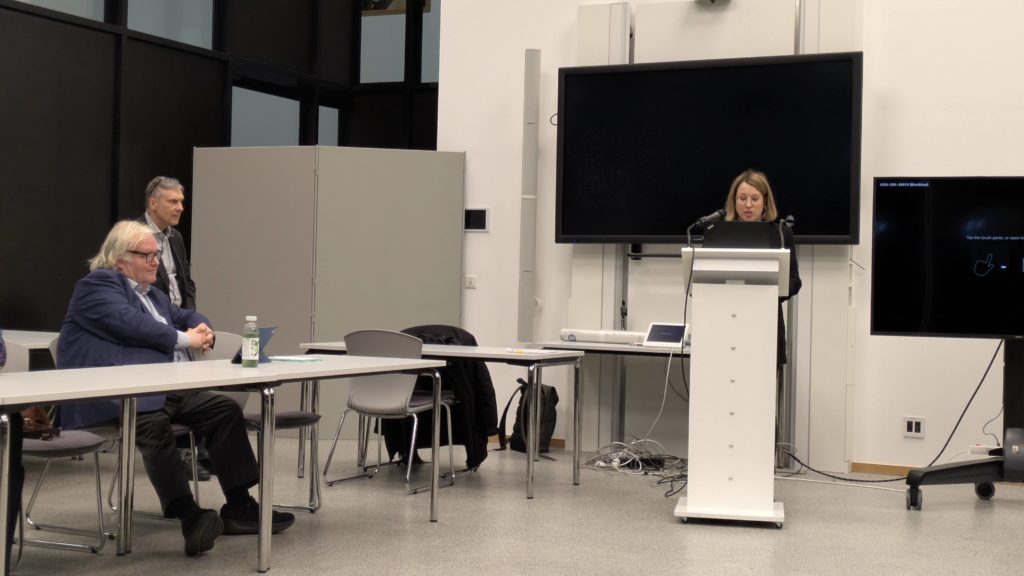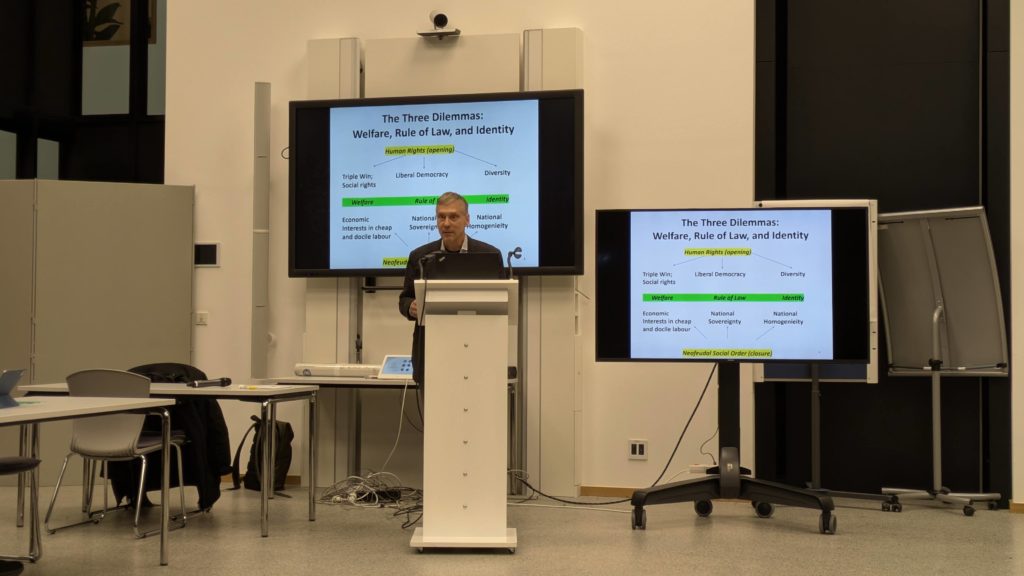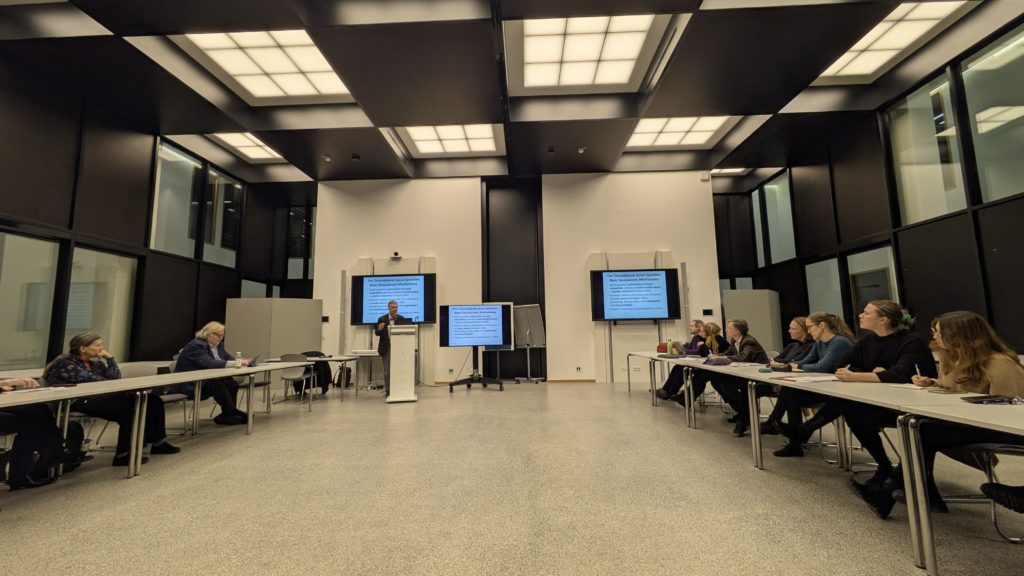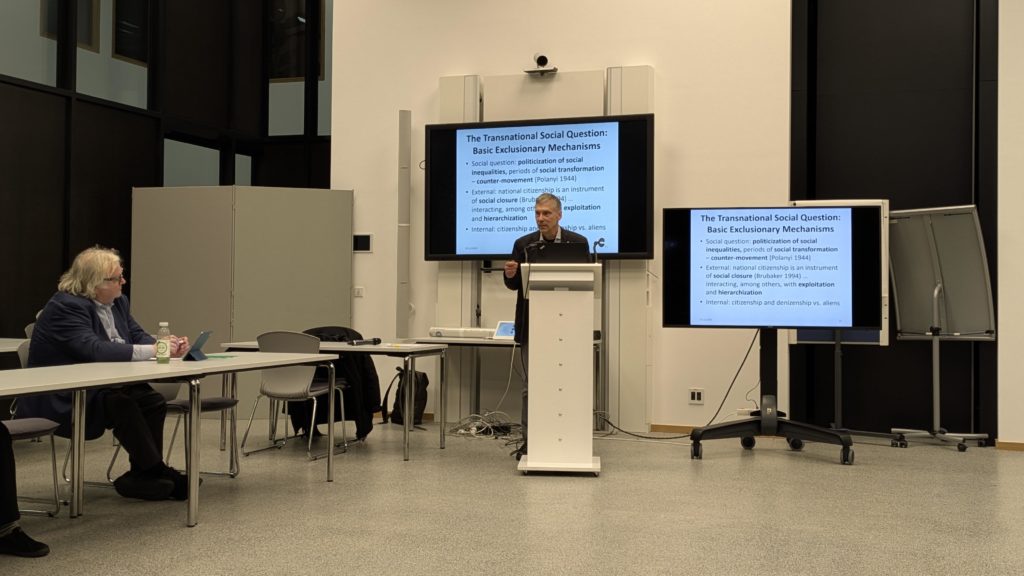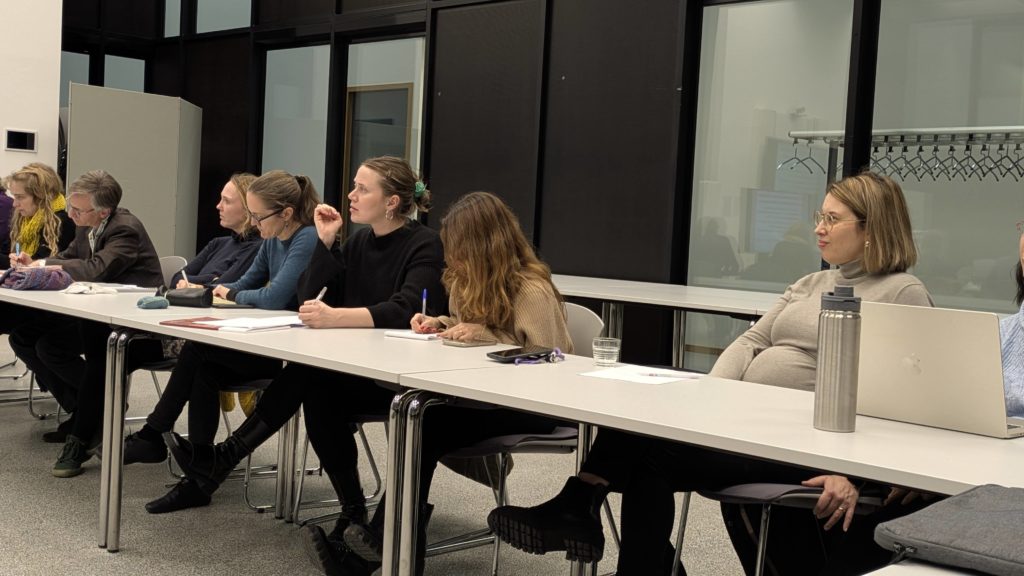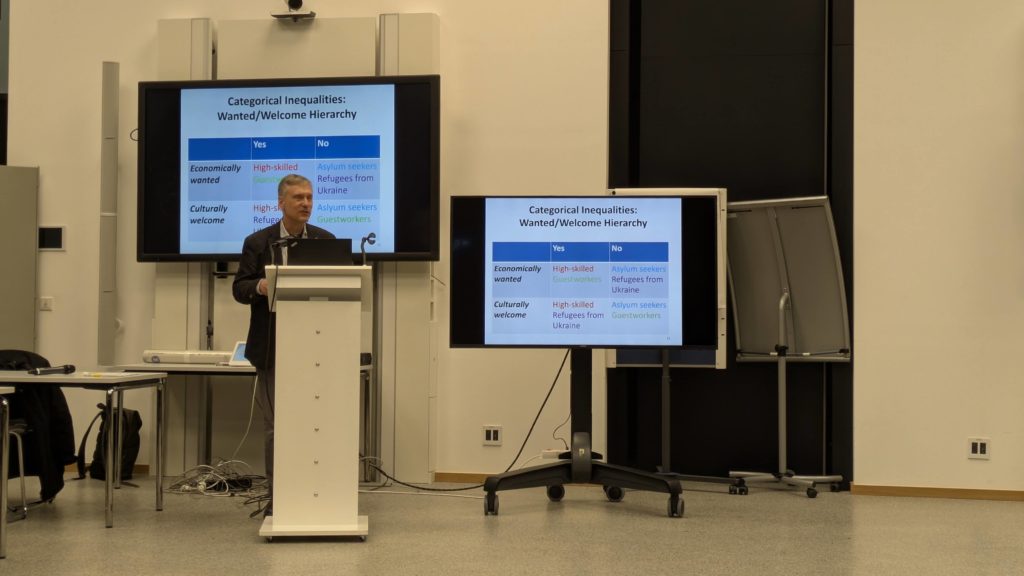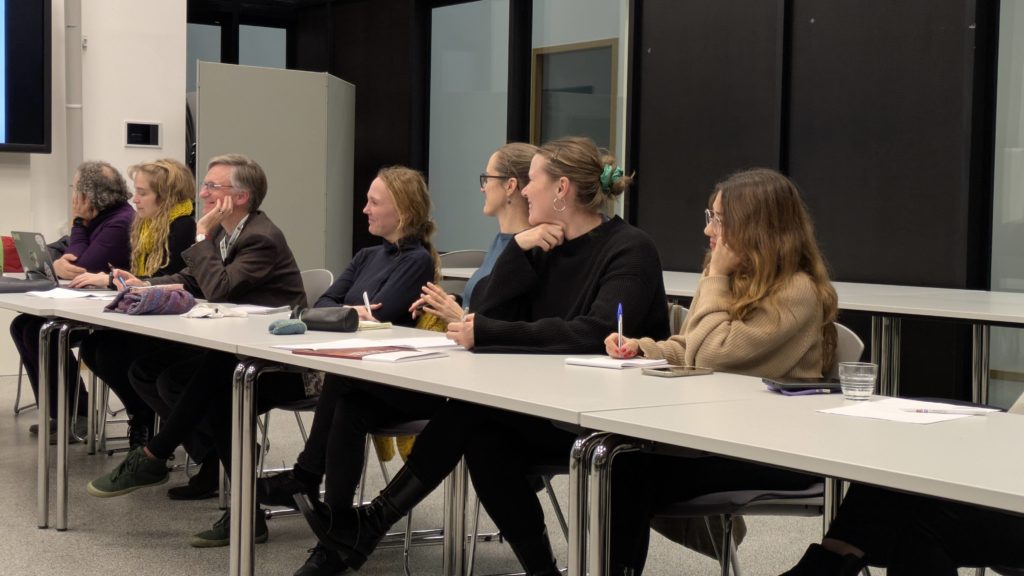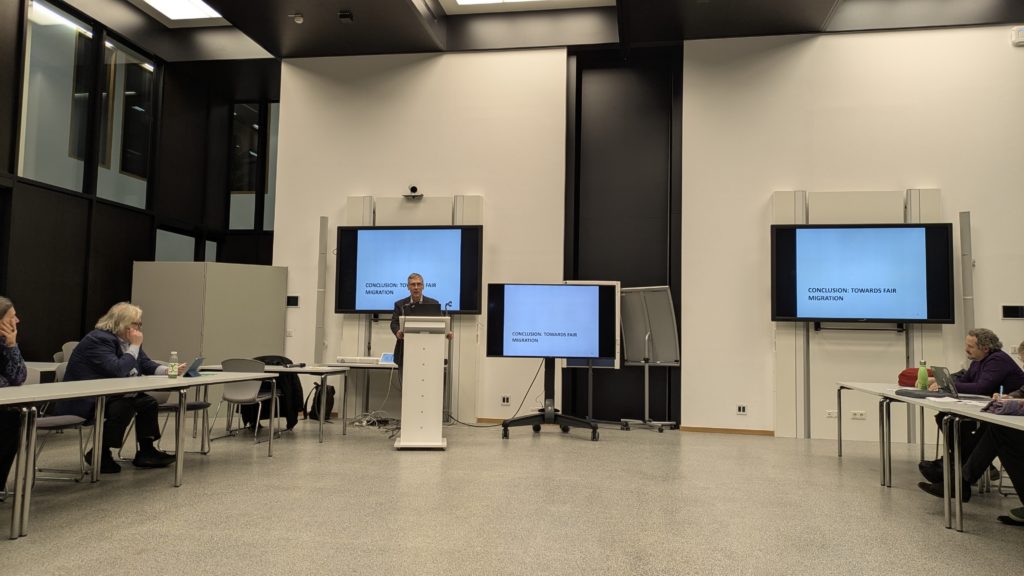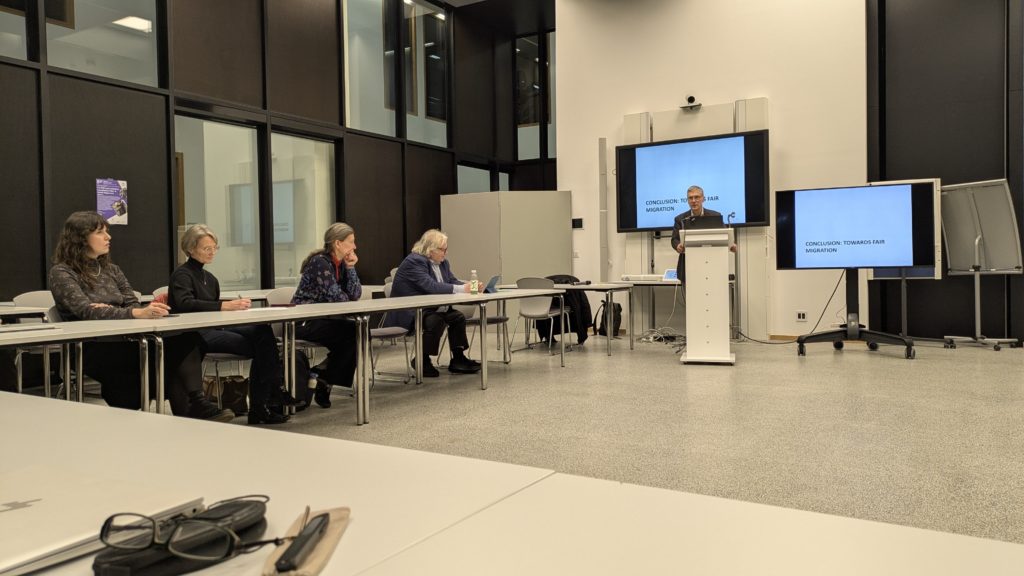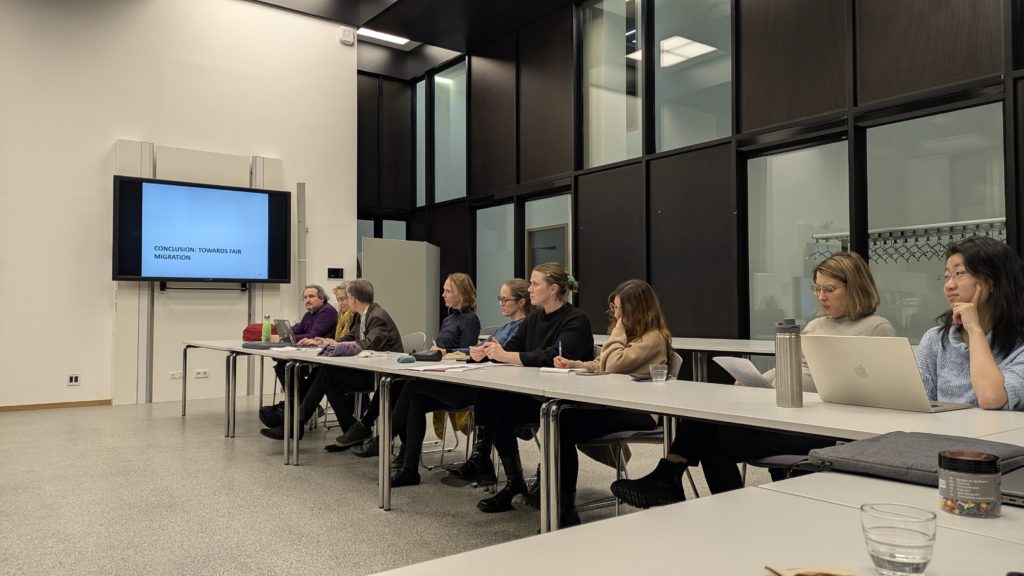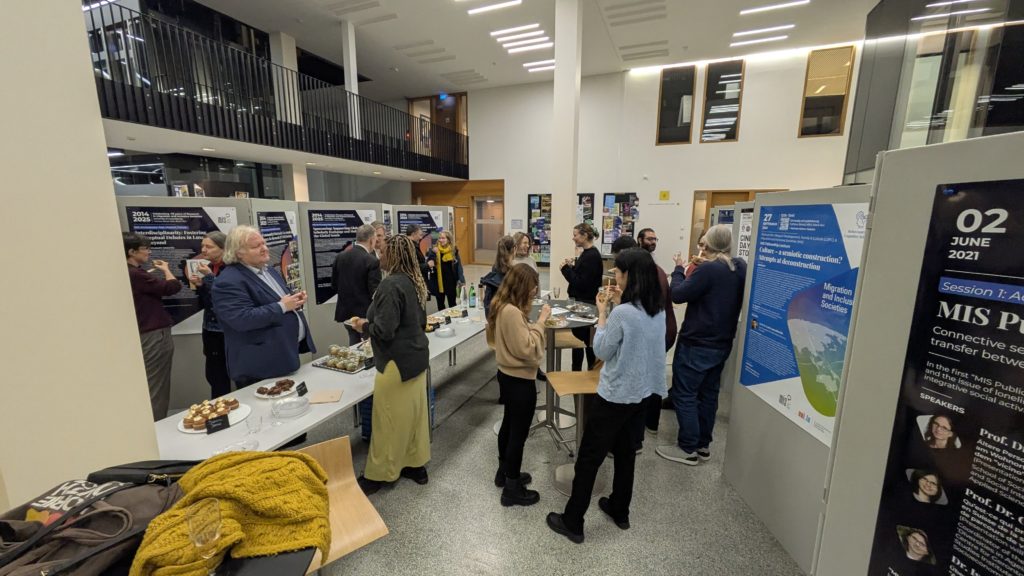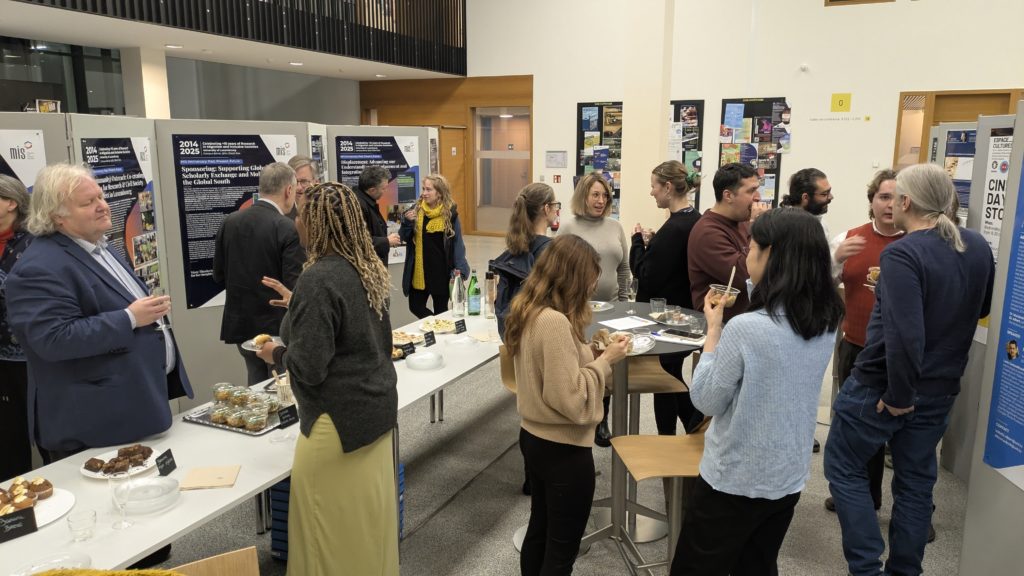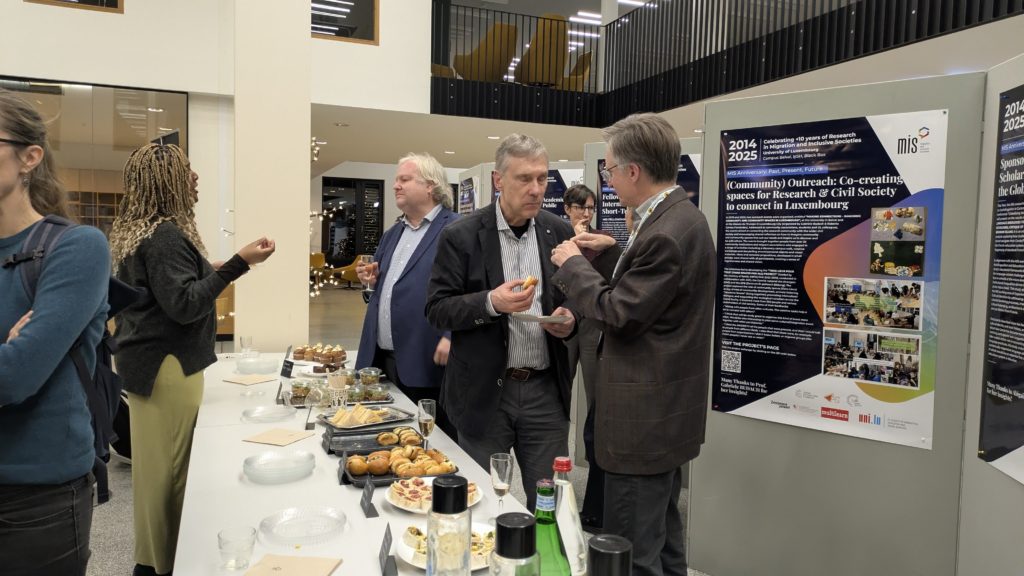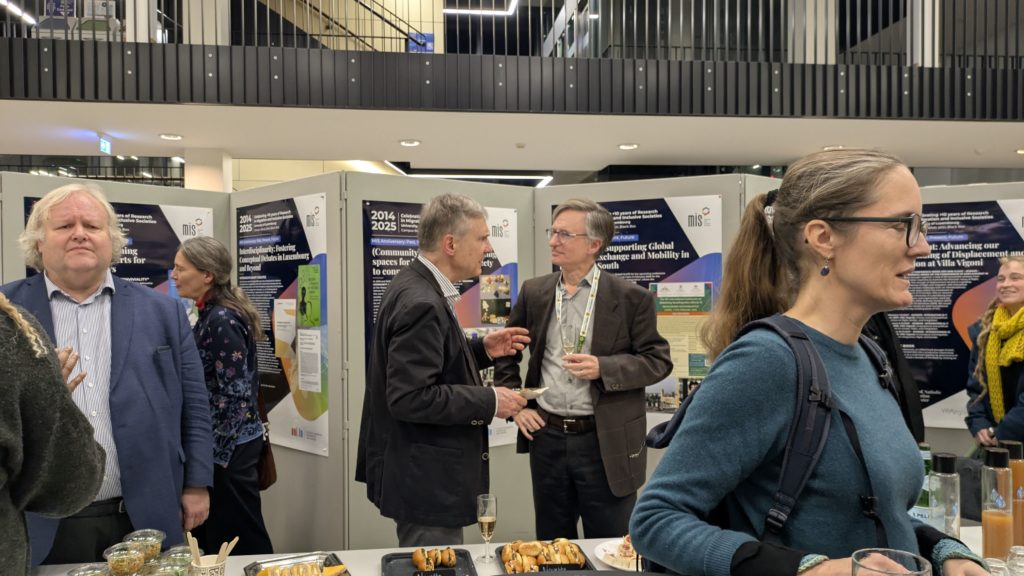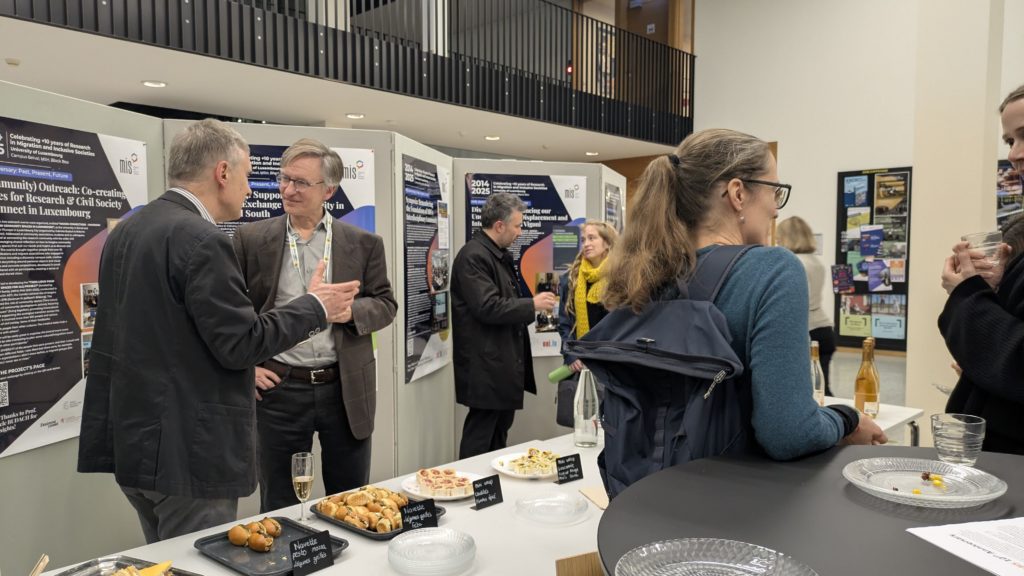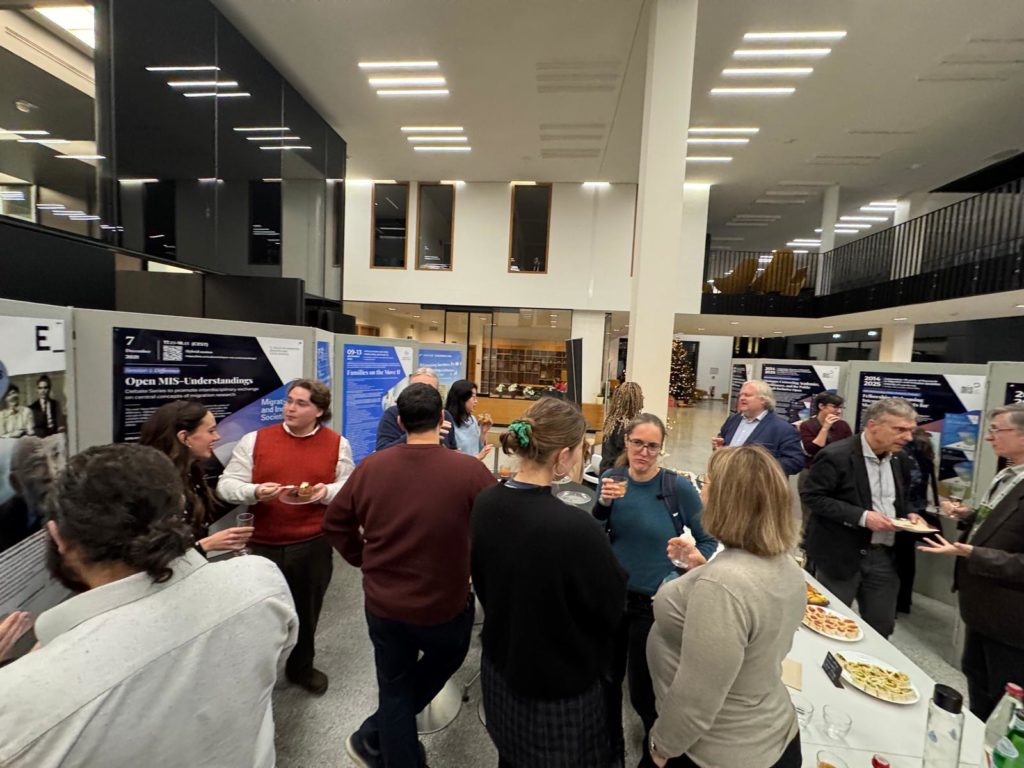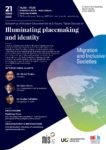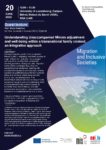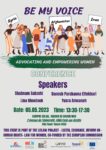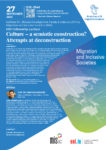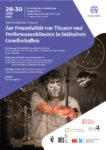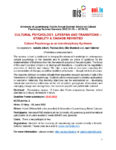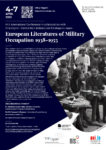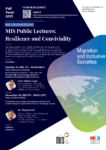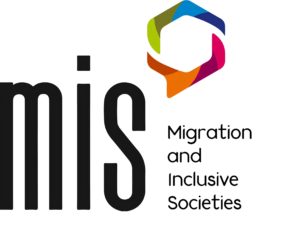
MIS 10th Anniversary Celebrations
December 3rd, 2025, | 10:00-20:30 pm
116 Rue de Luxembourg, L-4221 Esch-sur-Alzette,
SUMMARY EVENT
On December 3rd, the University marked the 10th Anniversary of MIS, the Key Research Area dedicated to interdisciplinary work on migration and inclusive societies within FHSE. MIS hosted a full day of events: Prof. Thomas Faist joined the morning doctoral colloquium, exceptionally open to MA students, followed by a presentation of the forthcoming volume Migration, Inclusiveness and Sustainability by Prof. Sergio Moldes-Anaya. An evening public lecture by Prof. Faist on “Migration, Inequalities and the National State”, followed by a reception. Throughout the day, the MSH also displayed a poster exhibition showcasing past, present, and future MIS initiatives. Many thanks to all who joined or contributed to the celebrations.
INTERNATIONAL GUESTS
Prof. Thomas Faist — Universität Bielefeld
Prof. Sergio Moldes-Anaya — Universidad Rey Juan Carlos
ORGANISATION & INFORMATION
MIS team
Pictures from the Event
Screening of Student Documentaries & Round Table Discussion
ILLUMINATING PLACEMAKING AND IDENTITY
June 21, 2023, | 14:00-13:30 pm
KINOSCH, KUFA – Kulturfabrik,
116 Rue de Luxembourg, L-4221 Esch-sur-Alzette,
INVITATION
The event presents four short documentaries produced during the first Spotlight Summer School in Opole in September 2022 by participating students (from Mainz, Luxembourg and Poland among others). The Summer School explored the complexity of identities and how they intertwine with migrant trajectories and the attachment to place.
The screening will be followed by a discussion with experts from anthropology, human geography and sociology who were involved in organizing and running the Summer School.
INTERNATIONAL GUESTS
Dr. Michal Wanke, Uni Opole
Dr. Agnes Eross, CSFK Geographical Institute Budapest/Uni Opole
Dr. Karina Gaibulina, Uni Opole/Uni St. Gallen
MODERATION
Madelaine Wood, PhD candidate at the University of Luxembourg and participant of the Spotlight Summer School
ORGANISATION & INFORMATION
Gabriele Budach, University of Luxembourg gabriele.budach@uni.lu
Understanding Unaccompanied Minors adjustment and well-being within a transnational family context: an integrative approach
(Guest lecture)
June 20, 2023, | 12:00-13:30 pm
University of Luxembourg, Campus Belval, Maison du Savoir (MSA), MSA 2.400
INVITATION
ABSTRACT
Among immigrant youth, Unaccompanied Minors (UMs) – migrating from their country of origin without their parents – are a unique subpopulation as they face substantial challenges before, during and after migration. Some of the challenges they face are separating from caregivers, dealing with acculturation stressors and traumatic events, experiencing different and unknown contexts alone and during a critical development period, such as adolescence. This presentation will provide an overview of UMs adjustment experiences and well-being within a transnational family context, based on available empirical evidence, and with reference to acculturation, developmental theories and contextual behavioral science.
This presentation is based upon work from COST Action CA21143, supported by COST (European Cooperation in Science and Technology).
Speaker
Dr Maria Koushiou is a licensed School and Clinical Psychologist based in Cyprus. She currently holds the position of Assistant Professor at the University of Nicosia (UNIC), Cyprus. Her research addresses questions in the field of child and youth psychology with a focus on affective processes. As a clinician, she has worked with vulnerable groups of youth, such as unaccompanied minors. She was first introduced to Acceptance and Commitment Therapy
(ACT) and contextual behavioral science (CBS) during her doctoral studies in 2014. Since then she continues to seek further training in ACT which she incorporates in both her research and clinical work.
Be My Voice Conference / Advocating and empowering women conference
May 5, 2023, | 13:30-17:30 pm
INVITATION
MIS Public Open Dialogues of MIS (a Key Research Area of the Faculty of Humanities, Education and Social Sciences devoted to Migration and Inclusive Societies) University of Luxembourg is related to connective series fostering open dialogues and reciprocal knowledge transfer between academics, professionals, and the public. This MIS Public Open Dialogues session is dedicated to Be My Voice Conference / Advocating and empowering women conference.
May 5, 2022, | 13:30-17:30 pm /
4th Floor/Room 4150
UNIVERSITY OF LUXEMBOURG / CAMPUS BELVAL, Maison du Savoir (MSA)
2, Avenue de l’Université / L-4365 Esch-sur-Alzette
Online/Webex: https://unilu.webex.com/unilu/j.php?MTID=ma396cf79562eae719a542b59130e01fe
BE MY VOICE CONFERENCE is a part of the project “LEILAW – Listen, Exchange and Inform on human rights Law for Women” of the assiciations Douri, Passerell and Ryse. The project is (co-)funded by the European Commission and aims to ensure the effective application of the legal framework protecting victims of gender-based violence for migrant women in Luxembourg.
Speakers and discussants
Shabnam Sabzehi
Danesh Parshaona Eftekahri
Lina Ghoutouk
Yusra Amounah
Organized by Douri, Passerell and Ryse in collaboration with Isabelle Albert and Koku G. Nonoa of MIS Public Open Dialogues on behalf of the Key Research Area MIS / University of Luxembourg.
MIS Fellowship Lecture
Culture – a semiotic construction?
Attempts at deconstruction
Prof. Dr. Lado Gamsakhurdia
27 September 2022, 12:15 – 13:45
Université du Luxembourg, Campus Belval, MSH, Black Box, and on Webex
Lado Gamsakhurdia is a professor of cultural psychology and psychological anthropology at the psychology department of Ivane Javakhishvili Tbilisi State University (Georgia) and is currently hosted at the Institute for Lifespan Development, Family & Culture (LDFC) in the framework of the Migration and Inclusive Societies (MIS) fellowship programme.
Interdisziplinäre Tagung
Zur Potentialität von Theater und
Performancekünsten in inklusiven
Gesellschaften
28-30 April 2022
Université du Luxembourg
Campus Belval,
Luxembourg Learning Centre (LLC),
2. Etage, Raum: LH2.02
Ausgehend von Jacques Rancières Überlegungen zu „Der unwissende Lehrmeister: fünf Lektionen über die intellektuelle Emanzipation“ (2007) und „Der emanzipierte Zuschauer“ (2008) interessiert sich diese internationale und interdisziplinäre Tagung für die epistemologische Erkundung, die Hinterfragung sowie die Neuperspektivierung der Zuschauenden- und Rezeptionspositionen in Bezug auf die Potentialität von Theater und Performancekünsten in reflexiven und inklusiven Gesellschaften.
Donnerstag, 28. April 2022 / Von 09.00 bis 18.30 Uhr
Panel 1: Theaterinstitution / Zur Potentialität und Strategien der Institutionskritik
Panel 2: Disabilities
Freitag, 29. April 2022 / Von 09.00 bis 19.00 Uhr
Panel 3: Dekoloniale / postkoloniale und feministische Strategien
Panel 4: Selbstperspektiven und reflexive (Re-)Präsentationen
Lecture Performance: „Blackout White Noise“
Samstag, 30 April 2022 / Von 10.00 bis 14.00 Uhr
Panel 5: Theatrale Dimensionen inklusiver Praktiken
Die Tagung ist auch über diesen Webex-Link zugänglich.
MIS Fellowship “Difference and Conviviality”
Call for applications in the framework of the Key Research Area MIS – Migration and Inclusive Societies
The Key Research Area MIS launches a call for a short-term mobility fellowship for professors and/or post-doctoral researchers not affiliated with an institution in Luxembourg.
The MIS is a Key Research Area of the Faculty of Humanities, Education and Social Sciences of the University of Luxembourg devoted to research on migration and inclusive societies. The members conduct inter- and cross-disciplinary research, teaching and outreach in migration studies with the aim of promoting inclusive societies. By fostering disciplinary and methodological diversity, they engage with the complexity of migration and inclusion processes in five working areas, each focusing on a specific aspect: global connectivity and socio-economic participation; diversity and social cohesion; cross-border movement and citizenship; multilingualism and educational challenges; experiences of borders and cultural identities.
What we offer:
- Fellowship (to be carried out in 2022) of two or three months with up to 2,500 EUR per month (monthly allowance of 1,500 EUR plus up to 1,000 EUR for accommodation)
- Status as Visiting Researcher at University of Luxembourg
- Access to central services of the university (library, email, office space)
- Integration into the interdisciplinary team of the Key Area MIS
Submission deadline: 15 May 2022
Earliest possible start date: 15 July 2022
Latest possible end date: 30 November 2022
What we expect:
The guest researcher is expected to participate in internal and external exchange activities of MIS. His/her contribution should focus on the nexus of migration, difference and conviviality. MIS is interested in both empirical studies and conceptual contributions to recent debates on difference and conviviality.
He/she will be expected to give a public lecture related to this topic and is invited to write a paper to be published in the Online Working Paper Series of the Key Area MIS.
The guest researcher should also be interested in developing and strengthening an international academic network and in future cooperation in migration-related research activities.
We invite applications from scholars from social sciences and the humanities with a background in migration research and/or border studies. Candidates must have a sufficient command of two of the three working languages of the University of Luxembourg (English, German, French).
How to apply:
- CV with your academic record (teaching, projects, publications)
- Specify the period and length (2 or 3 months) of your stay
- If applicable, indicate researchers whom you could envision as hosts.
- Abstract of your public talk
- Abstract of your writing project (MIS Working Paper Series)
Your application should be made in one of the three working languages of the University of Luxembourg (English, German or French).
Please send your application (1 file, max. 15 MB) until 15 May 2022 (11:59 pm) to Marina Laurent (marina.laurent@uni.lu)
The MIS-Consortium will review your application and communicate the results via email by 30 May 2022.
If you have questions, please contact by e-mail: Marina Laurent (marina.laurent@uni.lu)
More information:
University of Luxembourg: www.uni.lu
Faculty of Humanities, Education and Social Sciences: https://wwwen.uni.lu/fhse
Key Research Area MIS: https://mis.uni.lu
MIS-Funding 2022: Call for Projects
The Key Research Area Migration and Inclusive Societies (MIS) at the FHSE conducts inter- and cross-disciplinary research, teaching and outreach in migration studies with the aim of promoting inclusive societies. As part of this mission, the MIS-group would like to support migration-related research, teaching, and outreach at the FHSE. To that purpose, we have dedicated € 10 000 from our annual budget for 2022 to fund specific projects:
Submission deadline: 30 April 2022
Topics: Research pertaining to migration and inclusive societies (please see “scope” below)
Project duration: Until 31 December 2022
Funded by: MIS – Migration and Inclusive Societies (FHSE)
Contact: till.dembeck@uni.lu or marina.laurent@uni.lu
Budget: € 10 000 total; max. € 10 000 per project (to be used by 31 December 2022)
Eligibility
This call is open to all researchers at the FHSE who conduct research pertaining to migration and inclusive societies. While projects of PhD-students can be funded, the salary of PhD-students cannot be funded. It is possible to apply for a project as a group; in this case, one member of the group must be designated as the contact person to MIS or the Principal Investigator (PI). Groups may also include researchers from other Faculties or Interdisciplinary Centers of the University as well as Luxembourg Institutes, but in this case, the designated contact person or the PI must be a member of FHSE.
If you have questions, please contact till.dembeck@uni.lu or marina.laurent@uni.lu.
Scope
MIS invites proposals for research projects on the broader topic of migration and inclusive societies.
Successful project proposals will be teaching, outreach, and/or research oriented and must align with:
- at least 1 of the 5 Working Areas:
- Socio-Economic Participation & Global Connectivity
- Diversity & Social Cohesion
- Cross-Border Movement & Citizenship
- Multilingualism & Educational Challenges
- Experiences of Borders & Cultural Identities
- the MIS-Mission-Statement: The Key Research Area “Migration and Inclusive Societies” (MIS) at the FHSE (https://mis.uni.lu/en) conducts inter- and cross-disciplinary research, teaching and outreach in migration studies with the aim of promoting inclusive societies. Its activities include all aspects of life and borders, thereby going beyond addressing migration with purely economic or political questions. By fostering disciplinary and methodological diversity, MIS engages with the complexity of migration processes and of inclusion.
How to apply
Please submit an application with a summary of your proposed project (500 words excluding references) to marina.laurent@uni.lu by 30 April 2022.
In the application please state:
- The project title (at least preliminary)
- The objectives and expected results of your project
- Who is involved in your project (individual and group-applications are possible)
- how your project relates to at least one of the five MIS-working areas and the MIS-Mission-Statement
- how much funding you are applying for and why
- on what purposes you would want to spend the project money.
- Please note that all project expenses have to be in line with UL financial guidelines available on the intranet.
- a timetable of the course of your proposed project
The MIS-Consortium will review your application and results will be communicated via email by 15 May 2022.
Successful projects will be asked to:
- display the MIS-logo on all related material (posters, publications etc.) and acknowledge MIS-support in any other appropriate manner.
- open all related events to MIS-members
- present at MIS-events
- provide a written final report (500 words; including project title, use of funding, outcomes) after the funding period/project has ended, which may be put on the MIS-website; a report template will be sent out
University of Luxembourg: Fourth Annual Summer School on Cultural Psychology Summer Semester 2022
CULTURAL PSYCHOLOGY, LIFESPAN AND TRANSITIONS – STABILITY & CHANGE REVISITED
Cultural Psychology as an Interdisciplinary Synthesis
Co-organizers: Isabelle Albert, Thomas Boll, Elke Murdock and Jaan Valsiner
When: 31 May – 02 June 2022
Where: Hybrid (Webex link to be provided) & University of Luxembourg, Belval Campus
Participants: Interested PhD students at the University of Luxembourg and international participants of all junior academic levels (MA/MS and upwards)
Costs: There is no participation fee.
Registration: Students of the University of Luxembourg can inscribe directly in Moodle. External students: Please send an e-mail to sanda.cuturic@uni.lu
For more information – please contact: elke.murdock@uni.lu or isabelle.albert@uni.lu
European Literatures of Military Occupation 1938–1955
International Conference – April 4−7, 2022
Villa Vigoni, German-Italian Center for European Dialogue, Lake Como, Italy
Organisation & Contact: Matthias Buschmeier (Bielefeld University) / Jeanne E. Glesener (University of Luxembourg)
For online participation, please register here.
The conference agenda can be downloaded here
The Call for papers can be downloaded here
MIS Public Lectures: Resilience and Conviviality
We will access this field by distinguishing two different and, in a sense, complementary perspectives. The first sees migration as linked with crisis and vulnerability, the second sees it as linked with diversity and cultural difference. The public lectures will focus on recent debates revolving around two concepts that epitomize these parallel approaches: resilience and conviviality.
17:00h – 18:30h (CEST)
Canada Research Chair in Child, Family and Community Resilience
Director, Resilience Research Centre
Dalhousie University, Canada
Please download the poster here.
| Please note that this event is organised as a covid-free event. This means that: access to this event will be restricted to those who have been vaccinated, recovered or tested negative (self-testing on the spot or certified negative test) you will need the EU Digital Covid-Certificate (EU DCC) (digital or paper version) to prove your “covid-status” if you cannot provide one of the above, you will need to do a rapid test at the entrance of the event (this might take up to 15 minutes, so please arrive early |

17:00h – 18:30h (CET)
Contesting conviviality: Conceptual, political, and epistemological explorations about a troubling wor(l)d
Iberian and Latin American Department of the Historical Institute
Maria Sybilla Merian Center Conviviality-Inequality in Latin America
University of Cologne
Please download the poster here.
| Please note that this event is organised as a covid-free event. This means that: access to this event will be restricted to those who have been vaccinated, recovered or tested negative (self-testing on the spot or certified negative test) you will need the EU Digital Covid-Certificate (EU DCC) (digital or paper version) to prove your “covid-status” if you cannot provide one of the above, you will need to do a rapid test at the entrance of the event (this might take up to 15 minutes, so please arrive early |

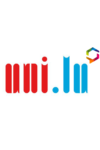
MIS organises second UL-wide migration-researchers assembly
MIS Public Lectures: Resilience and Conviviality
We will access this field by distinguishing two different and, in a sense, complementary perspectives. The first sees migration as linked with crisis and vulnerability, the second sees it as linked with diversity and cultural difference. The public lectures will focus on recent debates revolving around two concepts that epitomize these parallel approaches: resilience and conviviality.
17:00h – 18:30h (CEST)
Canada Research Chair in Child, Family and Community Resilience
Director, Resilience Research Centre
Dalhousie University, Canada
Please download the poster here.
| Please note that this event is organised as a covid-free event. This means that: access to this event will be restricted to those who have been vaccinated, recovered or tested negative (self-testing on the spot or certified negative test) you will need the EU Digital Covid-Certificate (EU DCC) (digital or paper version) to prove your “covid-status” if you cannot provide one of the above, you will need to do a rapid test at the entrance of the event (this might take up to 15 minutes, so please arrive early |

17:00h – 18:30h (CET)
Contesting conviviality: Conceptual, political, and epistemological explorations about a troubling wor(l)d
Iberian and Latin American Department of the Historical Institute
Maria Sybilla Merian Center Conviviality-Inequality in Latin America
University of Cologne
Please download the poster here.
| Please note that this event is organised as a covid-free event. This means that: access to this event will be restricted to those who have been vaccinated, recovered or tested negative (self-testing on the spot or certified negative test) you will need the EU Digital Covid-Certificate (EU DCC) (digital or paper version) to prove your “covid-status” if you cannot provide one of the above, you will need to do a rapid test at the entrance of the event (this might take up to 15 minutes, so please arrive early |

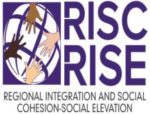
2021 International Conference of the Consortium for Comparative Research on Regional Integration and Social Cohesion-Social Elevation (RISC-RISE):
Social Partnerships and Regional Integration
Organized by the University of Luxembourg, the Luxembourg Institute of Socio-Economic Research, and the University of Johannesburg’s Department of Politics and International Relations
November 29 – November 30, 2021
Campus Belval
Dr. Christian Wille and Dr. Koku Nonoa of MIS will coordinate and chair Panel VII: Spatial and social convergences in border regions through civic engagement on comparative border and migration politics.
Conference format: Health restrictions permitting, the conference will be held in hybrid form with both in- person and remote presentations. The conference will include panels organized by the RISC-RISE consortium’s working groups (4 speakers per panel) and keynote speakers.

Virtual Exhibition Exploring Notions of Home @ IMISCOE 2021
The exhibition has been created by students of the Master in “Learning and Communication in Multilingual and Multicultural Contexts”at the University of Luxembourg.
As part of a course on ‘Creating and analysing visual data’ we explored notions of home and how students, their family and friends relate to this concept visually. Our exhibition shows the complexity of what ‘home’ means to us and the people with whom we connect. It gives a glimpse of who we are ∞ multilingual and diverse ∞, but, more importantly, it tells stories about what we all have in common.
Enjoy our exhibition! We hope you will feel ‘at home’.

Flucht – Grenze – Integration / Fuga – Confine – Integrazione
Beiträge zum Phänomen der Deplatzierung / Contributi al fenomeno dello spostamento
Book publication on the 2017-2019 Villa Vigoni collaboration project
Heimböckel, Dieter / Roelens, Nathalie / Wille, Christian (eds.) (2020): Flucht – Grenze – Integration / Fuga – Confine – Integrazione. Beiträge zum Phänomen der Deplatzierung / Contributi al fenomeno dello spostamento.(Interkulturalität. Studien zu Sprache, Literatur und Gesellschaft, Bd. 19), Bielefeld, Transcript Publishing
January 5, 2021, 240 pages, ISBN: 978-3-8376-5117-1
Wo und wie ereignen sich Grenzen? Inwiefern werden Migrant*innen zu Teilnehmer*innen von Regulierungspraktiken instrumentalisiert und in welcher Form werden damit auch Fragen der Integration berührt? Unter diesen Aspekten setzen sich die Beiträger*innen dieses italienisch- und deutschsprachigen Bandes mit dem Verhältnis von Flucht, Grenze und Integration in literatur- und kulturwissenschaftlicher sowie räumlich-geographischer Perspektive auseinander. Ziel ist es, die Momente von Flucht, Grenze und Integration in ein produktives Spannungsverhältnis zu bringen und als eine von Phänomenen der Deplatzierung zusammengehaltene Trias zu diskutieren.

MIS organised first UL-wide migration-researchers assembly – Thank you for attending!
To get to know each other, we would like to invite you all to put together one slide about you and (one of) your project(s), which you can email us in advance (nicole.holzapfel-mantin@uni.lu) or share with us during the assembly. If you have any further questions, please feel free to contact nicole.holzapfel-mantin at uni.lu.
Please share!

MIS-Funding 2021: Call for projects now closed – submitted projects under review – Thank you for your submissions
MIS would like to continue supporting migration-related research, teaching, and outreach at the FHSE. To that purpose, we have dedicated € 10 000 from our annual budget for 2021 to fund specific projects
More information:
Submission deadline: March 15, 2021
Topics: Research pertaining to migration and inclusive societies (please see “scope” below)
Project duration: Until December 31, 2021
Funded by: MIS – Migration and Inclusive Societies (FHSE)
Contact: till.dembeck@uni.lu or nicole.holzapfel-mantin@uni.lu
Budget: € 10 000 total; max. € 3000 per project
Eligibility
This call is open to all researchers at the FHSE who conduct research pertaining to migration and inclusive societies. While projects of PhD-students can be funded, the salary of PhD-students cannot be funded. It is possible to apply for a project as a group; in this case, one member of the group must be designated as the contact person to MIS or the Principal Investigator (PI). Groups may also include researchers from other Faculties or Interdisciplinary Centers of the University as well as Luxembourg Institutes, but in this case, the designated contact person or the PI must be a member of FHSE.
Scope
MIS invites proposals for research projects on the broader topic of migration and inclusive societies.
Successful project proposals will be teaching, outreach, and/or research oriented and must align with:
- at least 1 of the 5 Working Areas:
- Socio-Economic Participation & Global Connectivity
- Diversity & Social Cohesion
- Cross-Border Movement & Citizenship
- Multilingualism & Educational Challenges
- Experiences of Borders & Cultural Identities
- the MIS-Mission-statement:
The Key Research Area “Migration and Inclusive Societies” (MIS) at the FHSE (https://mis.uni.lu/en) conducts inter- and cross-disciplinary research, teaching and outreach in migration studies with the aim of promoting inclusive societies. Its activities include all aspects of life and borders, thereby going beyond addressing migration with purely economic or political questions. By fostering disciplinary and methodological diversity, MIS engages with the complexity of migration processes and of inclusion.
How to apply
- Please submit an application with a summary of your proposed project (500 words excluding references) to nicole.holzapfel-mantin@uni.lu by March 15, 2021
- In the application please state:
- The project title (at least preliminary)
- The objectives and expected results of your project
- Who is involved in your project (individual and group-applications are possible)
- how your project relates to at least one of the five MIS-working areas and the MIS-Mission-Statement
- how much funding you are applying for and why
- on what purposes you would want to spend the project-money
- Please note that all project-expenses have to be in line with UL financial guidelines
- a timetable of the course of your proposed project
The MIS-Consortium will review your application and results will be communicated via email by March 31, 2021.
Successful projects will be asked to:
- display the MIS-logo on all related material (posters, publications etc.) and acknowledge MIS-support in any other appropriate manner.
- open all related events to MIS-members
- present at MIS-events
- provide a written final report (500 words; including project title, use of funding, outcomes) after the funding period/project has ended, which may be put on the MIS-website; a report-template will be sent out

7th UniGR-CBS Seminar – Border Literature
Organized by the organized by the Université de Lorraine
May 20 & 21, 2021 online (via zoom)
The objective of the seminar is to explore the ways in which the border is written and represented in literature. In what way does literary creation constitute a means of access to the ideality of places, to the imaginary of territory, to the border paradigm?
Please register here.
Download the progamme in German and French.
The seminar is part of the UniGR-CBS thematic focus “Language – Culture – Identity”. It deals with issues in the humanities and social sciences which grapple with the social negotiation of borders and divergences in everyday life, in the field of aesthetics and in migration contexts.

2021 International Conference of the Consortium for Comparative Research on Regional Integration and Social Cohesion-Social Elevation (RISC-RISE):
Social Partnerships and Regional Integration
Organized by the University of Luxembourg, the Luxembourg Institute of Socio-Economic Research, and the University of Johannesburg’s Department of Politics and International Relations
November 29 – November 30, 2021
Campus Belval
Call for Papers open – Deadline May 20, 2021
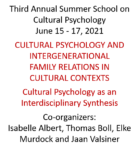
3rd Annual Summer School on Cultural Psychology
Workload: Pre-reading: approx. 15 hours plus Poster preparation
Deadline Poster submission: 10.06.2021*
ECTS points: 2
Where: Hybrid
Participants: Interested UL-PhD students and international participants of all junior academic levels
Costs: FREE!
Registration: UL-Students of the University of Luxembourg can register via Moodle.
External students: Please e-mail sanda.cuturic at uni.lu
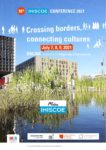
IMISCOE 2021 Conference Crossing Borders, Connecting Cultures
July 7, 8, 9, 2021
ONLINE, hosted by the FHSE
More Info
Borders are vital features of our life, and bordering processes a substantial part of how we negotiate territory, access to space, goods, social status and belonging; in other words, our relationships to others and the environment in which we live.
Focusing on migration and the movement of people in and across time, space and social orders, sharpens our understanding of the complexity of borders, why they exist, to whom they matter and what it takes to perceive, navigate, cross or circumvent them. These navigations can look very different for people with specific backgrounds, pertaining to language, culture, race and, importantly, passport.
Previous conferences have looked into migration, the political, economic forces driving it, the ways it is patterned, administered and controlled by state border regimes, and the consequences migration has created for people who move and societies accommodating people on the move.
Following this line of enquiry, this conference proposes to zoom deeper into the migration experience of people by foregrounding how migration is being connected to culture. We suggest exploring the nexus of migration and culture in more depth asking how migration is lived, experienced, reflected in, and mediated, in particular, through cultural and artistic practice. We seek to investigate this lens as a way to deepen our understanding of the complexity and difference of migration experience , on the one hand, and the possibilities of connecting different migrant experiences and groups of people , on the other.
Luxembourg seems an ideal place to frame such a reflection. Being itself very small, Luxembourg benefits from an economic mobility that is particularly high and diverse. More than half of the population are of second or third generation migrant background, reflecting the country’s past as a key player in the coal and steel industry. The country’s more recent success as a capital in finance and banking, and as an important political player promoting the European Union and running some of its major institutions has attracted a large number of a highly educated work force.
Situated at the heart of the Greater Region, including Luxembourg, France, Belgium and Germany, more than 180.000 people are crossing national borders with Luxembourg daily for work. While Luxembourg is, no doubt, a hub of mobility, the forms and experiences of mobility do vary greatly depending on the conditions of work and life.
This scenario allows us to understand some important issues in more depth:
✓ How are people involved in different forms of mobility (cross border workers, Luxembourgish residents, and newly arrived migrants) experience migration or ‘mobility for work’?
✓ What places and forms of ‘cultural encounter’ are created (or not) because of these mobilities?
✓ What meanings are circulated, negotiated, emerging in these ‘cultural encounters’?
✓ How do these experiences translate into forms of cultural and artistic practice? How are these experiences voiced, mediated and articulated through creative process (e.g. music, literature, film, fine and performing arts)?
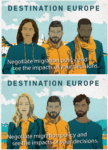
Destination Europe-Learning Tool @ IMISCOE 2021!
Destination Europe is an interactive desktop learning tool based on role-play. It accommodates 4-6 players and makes them experience migration decision-making as a complex process that involves different actors with sometimes conflicting interests. Players consider various migration challenges first at the European Union level and then in their national and city contexts. The tool illustrates real-life impacts policy decisions can have on various categories of migrants and the public in the countries that receive them. For more information on the tool, please refer to the attached flyer.
Download the Destination Europe Flyer

Water and Sea in Word and Image Conference
https://waterandsea2021.uni.lu
waterandsea2020 (@) uni.lu
July 12 – 16, 2021
